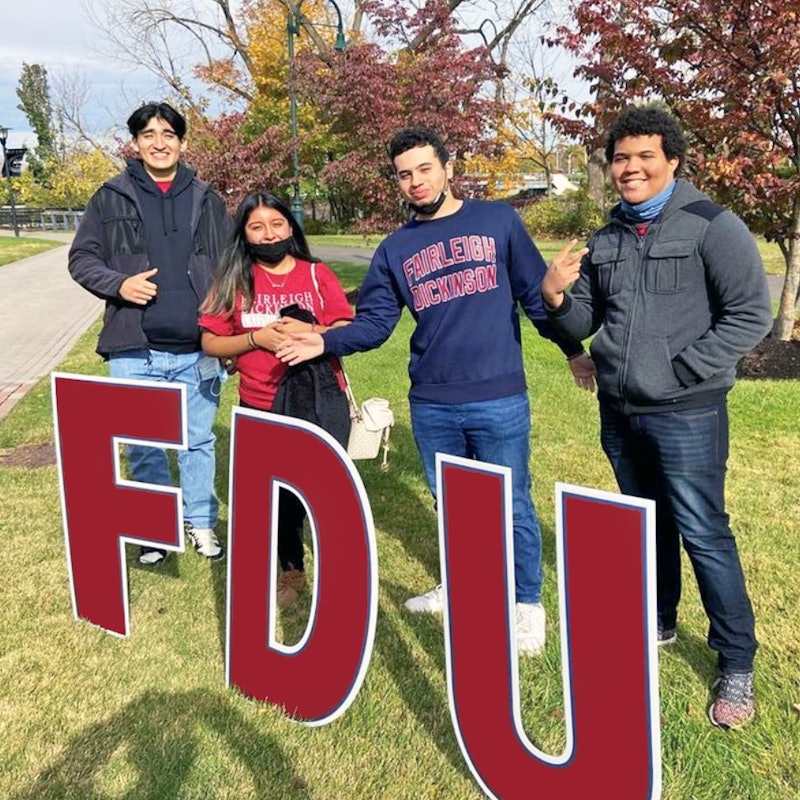FDU Programs Build Relationships to Positively Impact Hispanic Communities
 Fairleigh Dickinson University’s Latino Promise and Hispanics Achieving College Education Recognition programs provide mentorship and leadership training.
Fairleigh Dickinson University’s Latino Promise and Hispanics Achieving College Education Recognition programs provide mentorship and leadership training.
Created in 2005 by Excelencia in Education, Examples of Excelencia is a national initiative that recognizes institutions and nonprofit organizations that identify, aggregate, and promote evidence-based practices that improve Latinx student success in higher education. The four entities recognized this year span a diverse geographic area, but they share the mission of uplifting their communities while also creating a broader impact in terms of education and the workforce. Those entities are in the following categories: associate level, baccalaureate level, graduate level, and community-based organization. Following is a profile of the institution recognized as an Example of Excelencia at the associate level: Latino Promise and HACER at Fairleigh Dickinson University (FDU).
FDU's Latino Promise Program, which was launched in 2007, offers students with English fluency personalized support and resources for academic success. It also facilitates connections to FDU’s Latinx community at the Metropolitan and Madison campuses in New Jersey.
The Hispanics Achieving College Education Recognition (HACER) Program, launched in 2015, provides Spanish speakers the opportunity to learn English with free ESL courses and earn college credits on FDU’s Metropolitan campus. FDU belongs to the Hispanic Association of Colleges and Universities.
The four key ways that Latino Promise impacts participants are through personalized learning that includes one-on-one advising, tutoring and counseling, bilingual professors and staff, access and affordability, and inclusion of family. Bilingual professors and staff are also a hallmark of HACER, which provides students with a program tailored to their individual needs. This includes bilingual financial aid workshops.
“We go into local high schools and give presentations,” says Irene Oujo, executive director of FDU’s Hispanic Center, which houses 12 programs, Latino Promise and HACER among them. “They apply and we interview every single student. … That’s where we do our analysis of the student’s needs. For us, it’s important for the student to feel they’re not a number.”
Both programs maintain close relationships with high school counselors, teachers and school administrators to keep them informed about the programs so they can guide students through the application process. They offer workshops for school counselors and make presentations at churches and community organizations.
For those students with grade point averages below 2.0, there is a summer program with English, math and study skills that helps them get acclimated to a college environment. Those who do well can be accepted to the main program.
FDU’s associate of arts is a 60-credit, two-year program that places students in a supportive bilingual learning environment and includes a leadership seminar. Class sizes are small. Upon successful completion, students are admitted to FDU’s baccalaureate program. Those students still needing English language instruction have the option of transferring to Puerta Al Futuro, an FDU bachelor’s degree program that addresses the needs of bilingual students.
 Irene Oujo
Irene Oujo
The associate director of the Latino Promise and HACER programs acts as the official advisor to the students. Within the cohort of Latino Promise there are sub-cohorts of students with various areas of interest. Professors from some of those areas will come and speak to the students.
“We do that along the way as they’re earning their associate degree,” says Oujo. “That way, […] they have the opportunity for electives or courses that will fulfill the degree requirements for the associate’s but will also fit their intended major.
“We also bring speakers into the program and give the students a chance to connect,” she adds. “It’s about networking. … We’re constantly introducing them and expanding their network.”
Students and their families are engaged throughout the time students are involved with both programs. Some things were put on hold due to the pandemic, but this fall marks the return of college knowledge workshops for families.
“The college knowledge workshops have someone who talks to families … about some ways they can support the student,” says Oujo. “That holistic approach is what makes us successful. … [In many cases] we’re introducing the student and the family to what it means to go to college here at FDU as a Latinx student.”
Mentorship is provided in both programs. There is leadership training in which students meet Latinx leaders in business and the community. Field trips to places such as the New York Stock Exchange, the United Nations and the New Jersey State Assembly and Governor’s mansion are also available.
Rodriguez notes that FDU is a four-year institution that has created an associate level program focused on students who have not had the traditional admitted status to higher education. It provides a pathway with support services and a simplified transfer to pursue a four-year degree.
“In terms of access, it’s really being responsive to the community and students who may have been overlooked and building programs in English and Spanish,” says Rodriguez. “It’s an opportunity for students to participate and then go onto the bachelor’s degree.”
